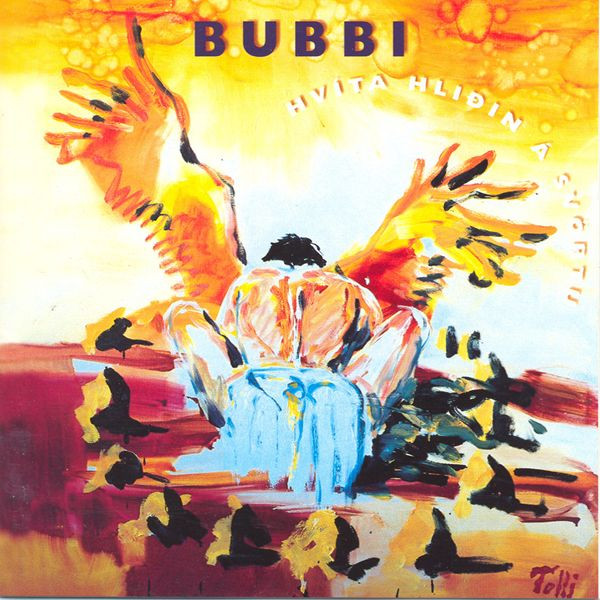Bubbi - Hvíta Hliðin Á Svörtu
Table of Contents
Download
Filename: bubbi-hvta-hliin-svrtu.rar- MP3 size: 184.6 mb
- FLAC size: 1125.8 mb
Tracks
| Track | Duration | Preview |
|---|---|---|
| Algjört Frelsi | 1:04 | |
| Þar Sem Blómin Eru | 1:49 | |
| Mýktin Kemur Með Aldrinum | 1:25 | |
| Hnefagull | 1:31 | |
| Þvottadagar | 1:23 | |
| Inúít | 2:26 | |
| Eintal Á Deildinni | 1:10 | |
| Arfberar | 1:15 | |
| Ferðalag | 1:08 | |
| Fyrir Austan | 1:27 | |
| Ljóð Handa Stelpu | 1:56 | |
| Eftirmæli Um Ljón Sem Hafði Tennur | 0:59 | |
| Vertíð | 1:23 | |
| Vekjum Ekki Nágrannann | 1:00 | |
| Kyssti Mig Engill | 1:09 | |
| Klukkan Átta | 0:56 | |
| Rangur Slóði | 0:41 | |
| Fjallakofinn | 0:54 | |
| Stutt Stopp | 1:02 | |
| Ströndin | 1:44 | |
| Þar Sem Reipin ERu Ekki Mannheld | 1:57 | |
| Náttúruöflin | 1:50 | |
| Herbergi 7 | 1:34 | |
| Það Vantar Blóð | 1:14 | |
| Saga | 1:13 | |
| Trú | 1:08 |
Images

Catalog Numbers
MM-003Labels
Mál og MenningListen online
- lyssna på nätet
- kuunnella verkossa
- ascolta in linea
- lytte på nettet
- escuchar en línea
- ouvir online
- online anhören
- online luisteren
- écouter en ligne
Formats
- CD
- Album
About Bubbi
Icelandic singer and songwriter, born in June, 6, 1956, Reykjavík, Iceland.
The youngest of four sons of a Danish mother and an Icelandic/Norwegian father. After his mother give him plastic guitar at the age of 12 Bubbi started playing influenced by stars like Bob Dylan, Peter, Paul and Mary and many others. He dropped out of school 14 years of age and started travelling around Iceland as a migrant fish worker and no matter where Bubbi was, his guitar was always with him.
When he decided in late 1979 to record his debut album, Ísbjarnarblús (1980), he had no idea how much impact it would have. His intentions were to make an acoustic blues album, but inspired by Iggy Pop and other new-wave artists, the albums style changed considerably during the sessions. There were few musical innovations on Ísbjarnarblús, but the lyrics were revolutionary. Bubbi wrote uncompromisingly about the injustices of Icelandic society, particularly in regards to fish industry- and migrant workers.
Bubbi then formed the punk band Utangarðsmenn, which spearheaded the Icelandic new wave movement. When Utangarðsmenn disbanded, Bubbi formed the band Egó, which proved to be hugely popular, as was Bubbis 1983 solo album, Fingraför. In 1984, Bubbis rockn roll life style started to catch up with him, as reflected in the desperate themes in the lyrics on the album Lili Marlene, released by his band Das Kapital in late 1984. After ridding himself of some of his bad habits, he released the lyrically strong and reflective Kona (Woman) in 1985. Subsequently, Bubbi signed with Swedish record label Mistlur and recorded the polished rock album Frelsi til sölu (Freedom for Sale) with Swedish producer Christian Falk. The album was an enormous commercial success and its follow-up, Dögun (Dawn), released in 1987, was the biggest selling album in Bubbis career. He further consolidated his status in 1990 with the release of his critically acclaimed album Sögur af landi (1990).
Bubbi had long wanted to record a Spanish or South-American style album and that dream came true with the release of Von (Hope) in 1992. To record that album, Bubbi traveled to Cuba, along with producer and arranger Eyþór Gunnarsson, to record with local band Sierra Maestra. The album marked a completely new direction for Bubbi. Despite the exuberant arrangements and musical performances, the lyrics are a mixture of plaintive laments of loss and regret and the protest lyrics Bubbi was known for.
Bubbi Morthens remains one of Icelands most prolific and popular musicians. His 1993 album Lífið er ljúft (Life is Good) was a mellow country-tinged ode to married life; on the 1994 album 3 Heimar (3 Worlds) he experimented with rap music; he released three albums in the 90s with rock band G.C.D., which he formed with veteran musician Rúnar Júlíusson; he recorded a tribute album to his uncle, beloved crooner Haukur Morthens and a spoken word album of his poetry appeared in 1996. On his 1998 album Arfur (Heritage), he drew inspiration from traditional Icelandic rhymes and ballads and his latest releases contain everything from hard rock to church hymns.
Real Name
- Ásbjörn Kristinsson Morthens
Name Vars
- B. Morthens
- Bubbi
- Morthens
- Ásbjörn Kristinsson
